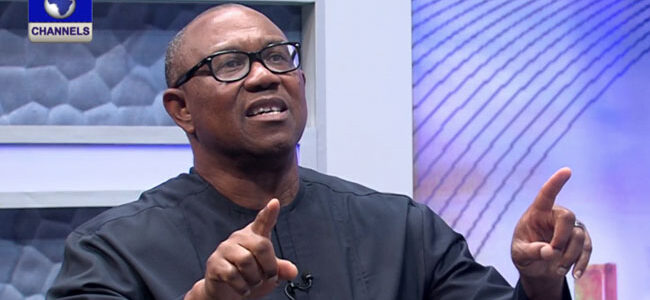
Labour Party (LP) Presidential Candidate, Mr Peter Obi says if given a chance in 2023, his administration would remove import and forex restrictions and insist on a single forex market as part of efforts to salvage Nigeria’s current forex crises.
According to Obi, the multiple exchange rate regime, which encourages capital flight and deters investment, has further worsened the country’s forex situationThe former Anambra State governor, took to his Twitter handle Tuesday, to list some of the things he would do for the country if elected President in 2023He also said he plans to bring down the unemployment rate of the country to fewer than 20 percent and boost the current $20 billion in remittances to $40b -$60b annually.

This, according to him will contribute up to 14% to the country’s total GDP.
“We will enforce the legal framework protecting foreign investors and their indigenous partners. This is the only way to tamper monopoly and capital flight.

“To restore investor confidence, we will explore ways of cushioning the forex demands by mainstreaming those components of Diaspora remittances that remain opaque and informal.”
He said.He stated that part of his objectives on the economy will be focused on supporting job creation given its impact on the economy as well as poverty alleviation.
“We will incentivize the resuscitation of the moribund cotton and textile industries; and full exploration of the cattle economy value chain, notably the $75b global hides and skin economy.
“There is a nexus between our debt –to-GDP ratio and our tax-to-GDP ratio, which this year has decreased by 1.3 percentage points, from 7.3% to 6.0%. Comparatively, our tax to GDP ratio is one of the lowest in the world, with some peer countries doing 15% to 25% percent.
“Our bane in this connection, is our over reliance on oil, excessive borrowings and fiscal indiscipline. A simplified but enhanced tax collection regime should address the prevailing challenges.” He disclosed.On food security, he said: “The first thing to tackle is food inflation. Once we tackle insecurity and farmers return to farms, our food production will go up and inflation will go down through reduced food prices. When you remove subsidy, our focus will be on agriculture and production-centered growth for food security and export, with more emphasis on exporting finished products instead of commodities and raw materials. This relates mainly food and textiles.
Speaking on the area of education, Obi said: “Our government shall prioritize education to serve the following functions: technical and industry relevance; alignment with local comparative advantages and factor endowments; modern skills proficiency, critical thinking,
“We will review the legislation guiding the fund access modalities to Universal Basic Education Commission (UBEC), and the Tertiary Education Trust Fund (TETFund), to redress prevailing bottlenecks, create greater transparency, and ensure increased flexibility,
“TETFund resources must be re-directed to funding of the Universities and other higher institutions robustly with a view to ending the perennial strikes by University Staff and workers. -PO
“Twenty million out of school children is a dire national crisis. As part of our Marshall Plan for Education, huge unmet housing needs as well high youth unemployment
“We will introduce a mandatory “No Child left Behind” educational policy, mindful that Nigeria’s inadequate investment in the social sectors such as health, education and housing, has resulted in large number out-of-school children.
He decried that a large number of the Nigerian workforce which is majorly made up of the youths do not have access to social security.
“Conditional Cash Transfers (CCT) are ad hoc palliative intervention measures. Salutary as they are, medium and long term social security regimes that are sustainable will be required. They must be protected by a social safety net. That is part of the government responsibility to protect” Obi said.
He also said he intends to decongest Lagos Ports through a deliberate policy of incentivizing end-destination priorities.
“This will also curtail on-land heavy haulage transshipments that take a tool on our road infrastructure.
According to Obi, “The Nigeria Maritime sector is robust and ought to grow stronger. We are blessed with several deep seaports. However, for some inexplicable reason, we tend to cluster our import and export activities around the Lagos Ports, thus creating avoidable bottlenecks.”
Credit: Daily Sun
